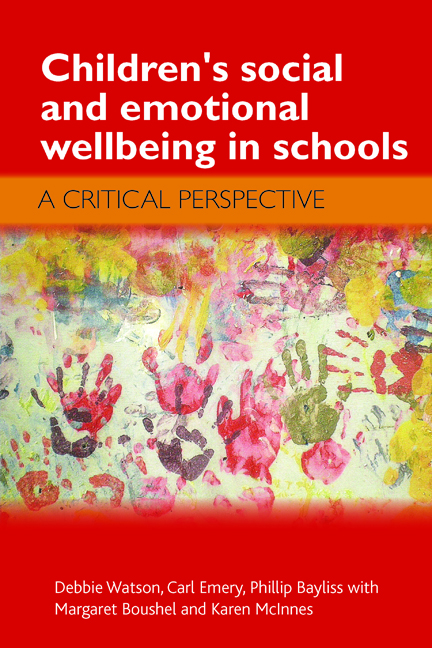Chapter 11 - Professionals supporting wellbeing in schools
Published online by Cambridge University Press: 01 September 2022
Summary
Introduction
This chapter considers concepts of care and support and the role of adults in providing for the social and emotional needs of children in schools: who they might be and how they can contribute to a reconceptualised notion of children and young people's wellbeing that foregrounds subjective understandings and the importance of relationships. In particular, we challenge notions of support for children with special educational needs (SEN) and disabilities, as well as for all children and young people, and this builds on the critique of inclusion in Chapter 6. There are, however, some general messages here for how all professionals in schools could support all children's social and emotional wellbeing.
In the same way as we have challenged wellbeing and its conceptual basis, we also need to ask what does support (for learning, wellbeing etc) look like and how can we theorise this? That is, how can adults impact upon children's experiences in schools and how can these be understood? We write this from the belief that ‘social support is something you do, not something you give’ (Taylor et al, 1998, p 1) and illustrate this with data obtained with school teachers and teaching and learning support staff, which challenges policy and occupational standards that seek to normalise the practice of professionals in schools.
The next section begins with a Foucauldian deconstruction of the concepts of ‘care’ and ‘support’, which while drawn from his analysis of medical practices, has resonance for this discussion of wellbeing support.
Care and support
‘Care’ and ‘support’, like ‘wellbeing’, are concepts that serve a function to name a phenomenon or problem. Linguistically, both care and support are nominalisations (noun forms derived from verbs), which provide objective ontologies of what may be presumed as something you can give. Can we negate these verbs? To ‘uncare’? To ‘unsupport’? These are grammatically unacceptable forms, in much the way we argue ‘ill-being’ as not functioning in the English language; but if we create adjectives (uncaring, unsupported), then these reflect states of subjects and objects. Indeed, if we revert to verb formulations of to care and to support, then the transitive verbs reflect activities (with human subjects and human objects): to care and to support is something we do. Such actions are reflective and reflexive.
- Type
- Chapter
- Information
- Children's Social and Emotional Wellbeing in SchoolsA Critical Perspective, pp. 175 - 192Publisher: Bristol University PressPrint publication year: 2012

